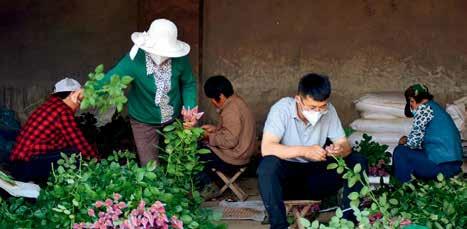Yuan Haibo The Voice of Migrant Workers
2020-08-10byZhangXue
by Zhang Xue

“I chose to return home and start a business, but I continue to speak for migrant workers,”declared Yuan Haibo, a millennial deputy to the 13th National Peoples Congress (NPC) from Tuanjie Village, Ciying Town of Qujing City in southwestern Chinas Yunnan Province.
This year was Yuans third trip to Beijing to participate in the two sessions, the annual meetings of Chinas top legislature and political advisory body.
Last year, he was serving as chairman of the labor union of Bonny International Holding Limited in Zhejiang Province, but he recently returned to his hometown of Qujing and founded a labor export company.
“I grew up in the village, and my parents and neighbors back home gave me a lot of help and support,”Yuan posted on social media before departing for Beijing. “I will never forget their support and my past as a migrant worker, and will continue to pay attention to, care for, and help my brother and sister migrant workers.”
Smoother Trails
To reduce the financial burden of his family, in 2010, Yuan ventured to the eastern Chinese city of Yiwu in Zhejiang Province, home to the worlds leading small commodities market, where he worked various jobs including selling hardware and small commodities on the streets.
Eventually, he was hired by a garment factory and worked his way up from the assembly line to become a workshop manager.
Yuan knows that many people who work far from home encounter various difficulties. During breaks, he would frequently chat with coworkers, listen to their thoughts, and help them solve problems. Gradually, many Yunnan migrant workers in Yiwu became familiar with Yuan.
In 2018, Yuan was elected deputy to the NPC, Chinas top legislature. According to statistics released by the State Council Leading Group Office of Poverty Alleviation and Development, China is home to 290 million migrant workers. As a representative of migrant workers, Yuan realized that he shouldered huge responsibilities.
Work experience in a big city broadened his vision and taught him many useful techniques and skills. When he realized that many young people from his hometown wanted to venture out for work but struggled to find a suitable job, Yuan found his calling.
In June 2019, Yuan returned home and founded a labor export service company. “As a former migrant worker, I understand the needs of both the rural labor force and enterprises in big cities,” he explained. “I established the labor export service company to pave a smoother road for villagers to find work outside.”
However, six months after the company was established, Yuan encountered a big problem. After the outbreak of COVID-19, many villagers who planned to go back to work after the Spring Festival holiday were stranded in their hometowns due to travel restrictions.
Coastal enterprises urgently needed employees to resume production while migrant workers had to stay at home because of the epidemic.“Many people dared not go out to work, partly because they were worried about the epidemic situation, but more due to concerns that no one would help them during this special time,” Yuan explained.
After assessing the situation, Yuan communicated with relevant local government departments and enterprises in Yiwu to figure out what positions needed to be filled. They then arranged buses to transport migrant workers directly from home to their workplaces for free.
On February 20, 2020, Yuan escorted the first wave of 101 migrant workers on four buses as they departed Qujing. After a 36-hour journey, they arrived in Yiwu.
After a few successful trips, more people were confident about boarding buses to resume work. During the outbreak, Yuan coordinated and escorted 800 migrant workers in seven groups to return to work.
Easier Return
After founding the company, Yuan discovered that the national targeted poverty alleviation strategy was improving conditions in his hometown, creating many employment opportunities. As a result, many migrant workers started to look at returning to start a business as he did, to contribute to the development of their hometowns.
“When they return, they use skills they learned outside to serve their hometowns,” Yuan beamed. “If they successfully establish an enterprise, they create jobs for locals and enable more people to stay and work in their hometowns, which will contribute to rural revitalization efforts.”
Yuan realized that the biggest difficulty for many migrant workers trying to return to start a business was a lack of funding. “Some returning villagers wanted to open a shop, some wanted to buy a truck to launch a transportation business, and others wanted to start animal husbandry businesses, but they all faced the common problem of having little collateral to secure a loan,” he said.
When defining a moderately prosperous society, the key is analyzing the living conditions of farmers. According to the government work report delivered by Premier Li Keqiang to the third session of the 13th NPC in Beijing on May 22, over 11 million rural people were lifted out of poverty in China last year, and the poverty headcount ratio fell to 0.6 percent—decisive achievements in poverty alleviation.

The report also announced that China would continue working to maintain social stability, accomplish the targets and tasks for winning the battle against poverty, and bring to completion the building of a moderately prosperous society in all respects this year. The country remains committed to ensuring the elimination of poverty in all rural residents below the current poverty line and in all poor counties this year.
How to win the fight against poverty with high-quality development and targeted poverty alleviation measures in the context of the epidemic to make sure no one is left behind on the road to a moderately prosperous society in all respects became a hot topic of the two sessions this year.
As a representative of migrant workers, Yuan shared his concerns in a proposal submitted to the NPC. He suggested the state introduce more preferential policies to support migrant workers seeking to start businesses at home. He offered the example of subsidies and loans with discounted interest rates for those starting businesses. Businesses that meet conditions for poverty alleviation and agricultural industrialization should get priority status for loan discounts.
He also suggested that the state expand the scope of available guarantee property for migrant workers to secure a start-up loan more easily.
“I hope more preferential loan policies are launched to support migrant workers seeking to start their own businesses at home, so they will find more channels to solve problems and secure start-up funding,” said Yuan.